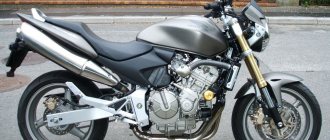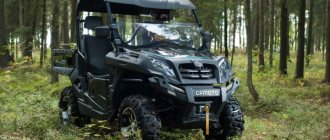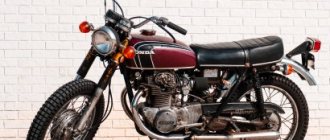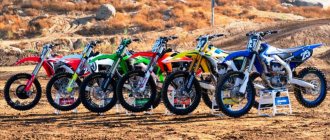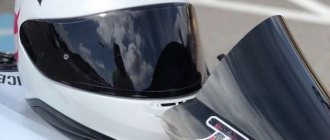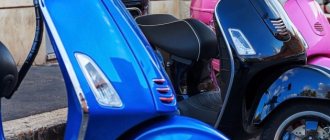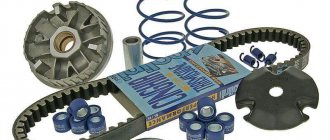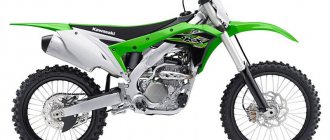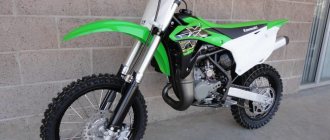03/23/2020 The world's first motocross competition was held at the beginning of the 20th century - in 1908. Oddly enough, in the initial stages of development, cross-country motorcycle racing did not arouse much interest among the general public. Only a few decades later motorsports began to gain popularity.
Initially, motocross competitions were held on the most ordinary motorcycles, more or less adapted for off-road driving manually, by the riders themselves and their teams.
The desire to take motocross competitions to a new level required the development of qualitatively new sports equipment - a special motocross motorcycle, fully adapted for riding on a motocross track.
Currently, motocross motorcycles are produced by numerous motorcycle companies. In this article we will present to your attention the best of them - we hope that our rating will help you decide on the choice of the ideal motocross motorcycle.
Motorcycles from Japanese auctions! Get a free consultation
Ask a Question
What is a motocross motorcycle?
Motocross motorcycles are intended exclusively for participation in cross-country racing. This is a kind of sports equipment not intended for driving on public roads.
A cross-country motorcycle cannot be issued with a vehicle passport and license plate; you do not need a driver’s license to operate it.
In general terms, a motocross motorcycle corresponds to the following scheme:
- Its design lacks light elements, wind protection, trunk, passenger seat, mirrors, and the exhaust pipe is raised up.
- The seat is enlarged and covers part of the gas tank - this is done for the comfort of the rider while riding.
- The suspension is characterized by a large stroke - 30 cm or more, and it is quite rigid.
- Light weight. To overcome serious obstacles on the track, everything unnecessary was removed from the design of motocross motorcycles, and modern lightweight and durable alloys made it possible to reduce the total weight of the motorcycle as much as possible.
- The main structural element that distinguishes a motocross bike from other motorcycles is the engine. Due to the nature of motocross racing, the engine constantly operates at maximum speed. Most often, motocross motorcycles are equipped with lightweight two-stroke engines, but there are also more modern models on the market - 4-stroke ones.
- Most motocross motorcycles are powered by a kickstarter (in this case, there is no battery in the design of the bike, which allows further reduction in the total weight of the unit).
In general, the design of a motocross motorcycle is designed so that the rider can overcome even the most difficult obstacles with maximum comfort (as much as possible on a rough track).
Tips for choosing
You can choose a really high-quality model, taking into account our tips and recommendations. It is useful to know the classification of motorcycles and their characteristics, then it is important to be able to choose a vehicle to suit your needs.
- Classification:
- Hard - this class is suitable for more professional drivers. Motorcycles of this type have lower weight and good strong parts.
- Soft - great for traveling over rough terrain and the city.
- Tourist - this type has rather poor cross-country ability, but the positive aspects include a comfortable fit and the provided protective arches.
- Engine capacity:
- Up to 250 cc see - the presented type of motors performs well in urban conditions, thanks to its maneuverability. Air cooled.
- From 250 to 300 cc. see - will be a good option for beginners to understand all the tricks of driving a motorcycle not on asphalt.
- From 400 to 800 cc. see - this type of engine is perfect for traveling over rough terrain, as well as for city driving. Perhaps the only negative side is the huge mass, which is approximately 140 kilograms.
The difference between a motocross motorcycle and an Enduro motorcycle
It is often difficult for a novice motorcycle enthusiast to understand the differences between a motocross motorcycle and an Enduro bike. And this is not surprising - after all, Enduros were developed on the basis of cross-country motorcycles by adding some structural elements and improving the chassis to be able to ride not only over rough terrain, but also on the most ordinary roads.
In order not to confuse real motocross motorcycles with Enduro bikes, you first need to understand their purpose. Cross bikes are sports horses whose main task is to give 100% and come to the finish line first. Well, for Enduro, endurance and maneuverability are more important.
Drawing parallels with running competitions, motocross bikes can be called sprinters - powerful, fast, working in one breath. Enduro bikes are marathon runners. They try to save energy as much as possible, distributing energy evenly throughout the competition.
The differences between a motocross motorcycle and an Enduro motorcycle are best seen in the following characteristics:
- Engine
. Cross-country motorcycles are designed for racing - and we are talking about quite complex routes with numerous natural and artificial obstacles (potholes, depressions, jumps, ditches, and so on). In such competitions, it is not endurance that is especially valued, but speed and power.
The main task of the racer is to reach the finish line first, steadfastly overcoming all the difficulties along the way. Its main assistant in this is a lightweight, powerful engine, which feels much better at maximum speeds than at lower speeds.
If we talk about the gearbox, the gears here are very short - this is due to the need to quickly develop high speed.
With Enduro, things are somewhat different - the specifics of the trails often require movement at low speeds to avoid obstacles, so for the most part, the engines on Enduro motorcycles are designed to operate at low speeds.
- Factory
. Cross-country involves covering the track in one sitting. In other words, the motorcycle starts only once - at the start. That is why motocross motorcycles typically have a kickstarter. An electric starter is included in the design extremely rarely - firstly, this is not a cheap pleasure, and secondly, unnecessary electronics significantly complicate the maintenance of the unit.For an Enduro bike, it is preferable to have an electric starter - this makes it easier to start the motorcycle if it accidentally stalls while overcoming a difficult obstacle.
- Electronics
. On motocross motorcycles, unlike Enduro, there are no lighting elements by default. Since cross-country racing takes place exclusively during the daytime, racers simply do not need headlights.Enduro competitions can take place at different times of the day, plus these units can be driven on public roads - which is why the presence of headlights and brake lights is mandatory here.
- Tank
. If we compare cross-country trails and enduro tracks, the former are much shorter. Accordingly, the racer will not need a large amount of fuel to participate in the cross-country race.Despite the fact that gasoline consumption on motocross motorcycles is slightly higher than on Enduro motorcycles, they are equipped with smaller tanks.
- Suspension system
. During Enduro competitions, the rider has the opportunity to avoid obstacles that stand in his way. In cross-country there is no such opportunity - if there is a springboard, you must jump. This is why the suspension in cross-country motorcycles is much stiffer than in Enduro, and the seating position is slightly higher.Low profile tires help provide maximum handling.
- Optional equipment
. In order to lighten the weight of a motocross motorcycle as much as possible, everything unnecessary is removed from its design. By and large, a motocross bike consists of an engine, frame, suspension and wheels.On Enduro there is minimal tuning - mirrors, wind protection, hand protection, footrest, and some models are equipped with passenger seats and luggage racks.
If, while reading this material, you suddenly realized that a motocross motorcycle is not exactly what you are looking for, we suggest you study the article “Rating of the best Enduro motorcycles”, in which you will find a description of this type of motorcycle, its advantages and disadvantages, and also a review of the best enduro models from Japan and Europe.
Off-road motorsports news
From an independent expert - professional racer Robbie Bell, who tested all six new models on the Pala track.
But before moving directly to the rating, we want to note that Robbie had a new LitPro device installed on his helmet, which reads information while passing the track. The most attentive of you have probably noticed this oblong plaque on the helmets of top AMA pilots: Ryan Dungey, Ken Roczen, Jason Anderson and many others. This is a device with hyper-sensitive GPS and an accelerometer for data processing. It is able to compare lap times on different trajectories, acceleration points, determine the height and distance of the jump, speed on different sections of the track, as well as compare data on sections of the track and show where you were the fastest.
We invite you to watch a video of the KTM 450 SX-F test by Robbie Bell and move on to the rating of 2021 models in the 450cc class:
First place - KTM 450SX-F
Advantages and disadvantages of motocross motorcycles
If you plan to do cross-country under the guidance of a coach and take part in cross-country competitions, the best solution would be to purchase a cross-country motorbike:
- Power
. The engines of cross-country motorcycles are “tailored” for driving with serious obstacles - they work perfectly at high speeds, quickly pick up speed, and at the same time fade out quite quickly at the bottom. In fact, during the race the engine is given its all, and after the competition it necessarily requires major repairs and maintenance. - Lightweight design
. The absence of unnecessary tuning elements and electronics helps to significantly reduce the weight of the unit, allowing the rider to more confidently pass even the most difficult elements of the track. - Stiff suspension
. Numerous jumps, landings from springboards, and overcoming obstacles during competition require a durable suspension that can withstand the most difficult loads. - Reliability
. The design of a motocross motorcycle is much simpler than a sports or classic bike. Completely sorting out the entire unit in a garage is as easy as shelling pears (provided you have the necessary tools and experience). - Availability
. You don't need a driver's license to drive a cross-country vehicle - after all, it is not a full-fledged vehicle, but specialized sports equipment.
At the same time, the technical characteristics of the cross-country vehicles imply at least minimal experience in operating such equipment.
When choosing a motocross motorcycle, you must be prepared for the fact that this is not a low-speed road bike - it is a powerful unit, which will be extremely difficult for you to handle without special training. Among the main disadvantages of “crosses” are the following:
- Power
. Oddly enough, in certain cases, advantages can turn into disadvantages. So, by overestimating your strength and trying to curb a zealous “cross horse” without proper training, you risk not only completely “killing” the engine, but also causing yourself several serious injuries - the fact is that “cross bikes” are not the easiest motorcycles to ride. , and even in comparison with related Enduro. - Limited scope
. When buying a cross, you must understand that you can only ride it on special tracks - these units are not registered with the traffic police, documents are not issued for them, so you won’t be able to drive it on the roads (in addition, taking into account the specific design of the cross motorcycle, riding on flat terrain will not bring any pleasure). - High rise
. For many motorcyclists, especially beginners, this can be a real inconvenience. For the same reason, these units are quite difficult for people with below average height to handle. - The need for regular maintenance
. Moreover, the “cross” needs to be serviced even during the race, for example, adding oil... What can we say about repairs after the competition - full engine maintenance with replacement of components, constant suspension tuning, tire replacement.
In order to deliver the “cross” to the place of training or competition, you will need separate transport, and for many this can be a problem.
Be that as it may, in order to fully enjoy all the benefits of motocross bikes, it is important to acquire at least a minimum of experience before getting into the saddle of this powerful iron horse.
Looking for reliable motorcycles in Japan? We will help
Free consultation
Content:
- Choosing an enduro motorcycle under 100,000 rubles
- Enduro from 100,000 to 200,000 rubles
- Enduro from 200,000 to 300,000 rubles
- Choice of enduro motorcycle at a price of 300,000 rubles. and more
- There is no difference between Chinese and Japanese motorcycles!
It’s funny, but at the time when I rode a Chinese enduro, they often wrote to me, saying why did you choose a motorcycle from China, it’s much better to take an ancient, but Japanese motorcycle. Then, when I drove an old Japanese car, they pestered me with diametrically opposite statements: “This is a ten-fold Japanese car, it will break down, you won’t find spare parts, and if you do find it, it will be very expensive”... and so on. So it’s almost like choosing a religion, the debate is at least no less heated.
In their own way, both are partly right. In this article, I will try to express my opinion on this matter as fully as possible.
My motorcycles Kayo T2 and Suzuki TS200R
Let's divide motorcycles into several price categories: up to 100 thousand, from 100 to 200 thousand, and from 200 to 300, and from 300 thousand and more.
Rating of the best motocross motorcycles - our top 10
The huge selection of motocross motorcycles on the market creates certain difficulties in choosing - many models have similar characteristics, reviews on them can be very contradictory, and prices for different brands differ markedly.
Our review of motocross motorcycles includes the TOP 10 best and most reliable bikes, according to experienced motorcyclists.
Suzuki RM-Z450
The model first appeared on the market in 2005, and to date the motorcycle has been practically not modernized. The weight of the motorcycle is 112 kg, which is quite large for motorcycles in this class. Nevertheless, the unit feels quite confident on the track and is characterized by excellent handling and maneuverability. Engine – 4-stroke, 1-cylinder, cooling – liquid.
The crossover design does not have an electric starter or battery (the unit is driven by a kickstarter).
Experienced motorcycle enthusiasts complain about the limited suspension settings due to a weak shock absorber and a rigid chassis.
At the same time, the Suzuki RM-Z450 can be upgraded quite well using good tuning parts.
Suzuki RM-Z250
The model began production in 2004. The Suzuki RM-Z250 received major updates in 2021, and all the innovations affected mainly the engine.
The model is equipped with a 4-stroke 1-cylinder engine, liquid cooling, aluminum frame, sports adjustable suspension, 5-speed gearbox, disc brakes. The mass of the unit is 106 kg, the tank capacity is 6-7 liters (gasoline).
Suzuki RM-Z250 is considered one of the slowest and weakest bikes in its class. The cross provides good maneuverability, but handling at high speeds leaves much to be desired.
The opinions of experts agree on one thing - the Suzuki RM-Z250 is an ideal option for those who are just learning the basics of driving motocross motorcycles, but is quite boring for experienced riders. The result is 9th place in our ranking.
Husqvarna FC 350
This model can be considered an intermediate link between the Husqvarna FC 250 and Husqvarna FC 450. Combining the light weight and maneuverability of a 250 cc and the power of its 450 cc “relative”, the Husqvarna FC 350 is an excellent compromise option for those who are not yet accustomed to “communication” with powerful crosses.
The unit is equipped with a 4-stroke 1-cylinder engine with a maximum power of 58 hp, a liquid cooling system, driven by an electric starter, a 7-liter gas tank, disc brakes, and a steel tubular frame.
All the characteristics of the Husqvarna FC 350 indicate that this is an excellent bike for experienced motorcyclists. Its only drawback is its high cost.
Husqvarna TC 125
Another representative of the Swedish motorcycle industry takes 7th place in our ranking. This lightweight cross is perfect for young riders. Moreover, you can not only train on it, but also represent your team with dignity at competitions of various levels. The Husqvarna TC 125 is deservedly considered one of the best 2-stroke motocross bikes.
The unit is equipped with a powerful 2-stroke 1-cylinder engine (40 hp), liquid cooling, 6-speed gearbox, front and rear brakes - disc, seat height - 95 cm, ground clearance - 37.5 cm. Excellent handling and maneuverability, excellent performance indicators, reliability - what else can you expect from a well-known European manufacturer? The only thing that’s not encouraging is the price – $7,000 for a used 2021 model.
Yamaha YZ 85
The model first entered the market in 2002. Initially, this cross was developed as a motorcycle for children and teenagers (up to 16 years old) and was intended for learning motocross.
Yamaha YZ 85 is equipped with a 2-stroke 1-cylinder engine (29 hp) with liquid cooling, sports fully adjustable suspension, steel frame, 6-gearbox, disc brake system, 5 liter gas tank.
Due to its purpose, the motorcycle is characterized by good handling and maneuverability. Unfortunately, it is not intended for adult riders. The price for this unit is low - starts at $1000.
Kawasaki KX250F
Despite its considerable weight (106 kg), the Kawasaki KX250F has a perfectly balanced chassis, copes well with maneuvers, and produces stable performance at any speed.
The model is equipped with a 4-stroke, 1-cylinder, liquid-cooled engine with a power of 43 hp, 5-gearbox, disc brake system, gas tank - 6-8 liters. One of the main advantages of the model is the ability to adjust the chassis (there are several positions for the footrest and steering wheel). As for the suspension, if configured correctly, it will undoubtedly delight you on any track.
Of course, the Kawasaki KX250F is not as good as its European competitors, but the price for these Japanese cross-country motorcycles is quite affordable - from $1800.
Husqvarna FC 250
This model is characterized by good stability on the highway and excellent handling. The 4-stroke 1-cylinder engine produces a power rating of 46 hp, the cooling system is liquid. The unit is driven by an electric starter, the gearbox is a 5-speed manual. Brakes – hydraulic disc.
The tubular steel frame provides reliability and durability. Good suspension settings allow you to feel comfortable on any track.
The Husqvarna FC 250 is one of the most expensive motocross bikes in its class, but the money spent is definitely worth it.
Kawasaki KX450F
A model that has caused many controversial reviews from the very beginning of serial production - in 2005. Fortunately, the Japanese company quickly responded to public opinion, quickly eliminating all the shortcomings, thanks to which today the Kawasaki KX450F is considered one of the best motocross bikes in its segment.
As for the indicators of stability in control, the Kawasaki KX450F fully meets the highest requirements - the unit develops excellent speed and feels confident when cornering. For the rider's convenience, there are several steering wheel settings, and the suspension is perfectly balanced.
The Kawasaki KX450F is equipped with a 4-stroke, 1-cylinder, liquid-cooled engine producing 53 hp. The gas tank is 6-7 liters, the brakes are disc.
KTM 250SFX
This cross bike has repeatedly brought victory at the highest level competitions. The KTM 250SFX is characterized by excellent handling and agility, performing well in corners. The 4-stroke single-cylinder engine with a liquid cooling system has a power of 39 hp. The unit is started by an electric starter or kickstarter.
The steel frame perfectly withstands heavy loads, and the adjustable suspension guarantees a comfortable ride on the race track. The brake system is disc.
The motorcycle is good in all respects, and some shortcomings can be easily solved by changing some settings. What is not at all pleasing is its cost. A new unit will cost $10,000; a used model in good condition can be purchased for $8,000.
Yamaha YZ450F
Many professional motorcycle racers agree that the Yamaha YZ450F can be called the ideal motocross bike. This unit has earned a lot of positive reviews largely due to its almost flawless engine - powerful and efficient.
The chassis and perfectly configured suspension (which many call the best in this cross-country segment) guarantee excellent handling in any racing conditions. The bike provides excellent stability at high speeds and feels confident when cornering.
The disadvantages of the unit include noisy operation and large width. Otherwise, he has no equal, so he takes an honorable 1st place in our “TOP 10 best crosses” rating.
| Place in the ranking | Manufacturer | Motorcycle name | Year of issue | Torque | Repairability | Weight | Cost, in US dollars $ |
| 10 | Suzuki Motor Corporation, Japan | Suzuki RM-Z450 | 2005-present | 50.0 Nm (5.1 kg*m) at 7500 rpm | Motocross motorcycles require frequent repairs and maintenance. All models presented in this category are repairable; it is quite possible to repair and maintain them yourself. | 112 kg | 1800 |
| 9 | Suzuki Motor Corporation, Japan | Suzuki RM-Z250 | 2004-present | 28.7 Nm (2.9 kg*m) at 8500 rpm | 106 kg | 2200 | |
| 8 | Husqvarna, Sweden | Husqvarna FC 350 | 2014-present | Not specified | 100 kg | 11500 | |
| 7 | Husqvarna, Sweden | Husqvarna TC 125 | 2014-present | 2.13 kg*m at 10,000 rpm | 87 kg | 7000 | |
| 6 | Yamaha Motor Company, Japan | Yamaha YZ 85 | 2002-present | 17.3 Nm (1.7 kg-m) at 10,500 rpm | 75 kg | 1000 | |
| 5 | Kawasaki Heavy Industries, Ltd., Japan | Kawasaki KX250F | 2004-present | 28.7 Nm (2.9 kg*m) at 8500 rpm | 106 kg | 1800 | |
| 4 | Husqvarna, Sweden | Husqvarna FC 250 | 2014-present | Not specified | 100 kg | 8500 | |
| 3 | Kawasaki Heavy Industries, Ltd., Japan | Kawasaki KX450F | 2005-present | 44.5 Nm (4.5 kg*m) at 6700 rpm | 113 kg | 2500 | |
| 2 | KTM Sportmotorcycle AG, Austria | KTM 250SFX | 2010-present | Not specified | 102 kg | 8000 | |
| 1 | Yamaha Motor Company, Japan | Yamaha YZ450F | 2003-present | 52.9 Nm (5.4 kg-m) at 6500 rpm | 100 kg | 3000 |
Top 5 Best 250cc Motocross Motorcycles
The ranking of the best 250 cc motocross motorcycles includes several models from our “TOP 10 motocross motorcycles” - Kawasaki KX250F (5th place in the TOP 5, 5th place in the TOP 10), Husqvarna FC 250 (2nd place in the TOP 5 , 4th place in the TOP-10) and KTM 250SFX (1st place in the TOP-5, 2nd place in the TOP-10).
Among other “lucky” ones are the following models:
HONDA CRF 250R – 4th place
The model is based on a 4-stroke 1-cylinder engine with a liquid cooling system and a power of 44 hp. Gearbox – 5-speed, manual. Brake system – disc. The frame is aluminum. Since its launch on the market, the model has undergone several significant changes, including in the engine design. Today the bike can be described as powerful, well controlled, equipped with good adjustable suspension.
At the same time, the HONDA CRF 250R often receives negative reviews due to a poorly tuned engine (to achieve a comfortable ride you have to “ask for help” quite often to the clutch and gearbox).
Yamaha YZ250F – 3rd place
The main feature of this unit is the engine (4-stroke, 1-cylinder), which feels great at low speeds. At the same time, not everything is so smooth with the “tops”. Started by kickstarter.
It’s not for nothing that the suspension is considered one of the best in this segment of motocross bikes - the motorcycle provides good handling, stability at high speeds, and feels good in high-speed turns.
The light weight (only 93 kg) does not prevent the rider from feeling a little bulky in the Yamaha YZ250F - all due to its large width (82.5 cm).
| Place in the ranking | Manufacturer | Motorcycle name | Year of issue | Torque | Maintainability | Weight | Price |
| 5 | Kawasaki Heavy Industries, Ltd., Japan | Kawasaki KX250F | 2004-present | 28.7 Nm (2.9 kg*m) at 8500 rpm | Repair and maintenance are possible both in specialized service centers and on your own. | 106 kg | 1800 |
| 4 | Honda Motor Co., Japan | HONDA CRF 250R | 2004-present | 29.4 Nm (3.0 kg*m) at 8000 rpm | 103 kg | 3500 | |
| 3 | Yamaha Motor Company, Japan | Yamaha YZ250F | 2001-present | 93 kg | |||
| 2 | Husqvarna, Sweden | Husqvarna FC 250 | 2014-present | Not specified | 100 kg | ||
| 1 | KTM Sportmotorcycle AG, Austria | KTM 250SFX | 2010-present | Not specified | 102 kg |
comparison table
| Place | Power (hp) | Cooling type | Fuel injection system | Number of bars | Gas tank capacity (l.) | Price, rub.) |
| 1. LONCIN SX2 LX250GY-3 | 18 | Air-oil | Carburetor | 4 | 9 | 135 000 |
| 2. Racer Ranger RC250-GY8A | 26 | Liquid | Carburetor | 4 | 12 | 165 000 |
| 3. Motoland XR250 Enduro | 21 | Air | Carburetor | 4 | 12 | 145 950 |
| 4. Avantis Enduro 250 | 21 | Air | Carburetor | 4 | 6,5 | 205 990 |
| 5. Irbis TTR 250 | 15 | Air | Carburetor | 4 | 12 | 125 900 |
| 6. Kayo K6-R 250 ENDURO | 27 | Liquid | Carburetor | 4 | 7,5 | 297 490 |
| 7. Avantis A7 Lux | 26 | Liquid | Carburetor | 4 | 6,5 | 219 990 |
| 8. MOTOLAND XR250 Lite | 18 | Air | Carburetor | 4 | 6 | 117 600 |
| 9. Motoland WRX250 Lite WFA | 22,4 | Liquid | Carburetor | 4 | 6,5 | 190 000 |
| 10.KAYO T2 250 ENDURO | 20 | Air | Carburetor | 4 | 9 | 180 000 |
| 11. ZID YX250GY-C5C | 14,7 | Air | Carburetor | 4 | 10 | 80 000 |
| 12. ZUUM PX250 | 21 | Air | Carburetor | 4 | 6,5 | 140 000 |
Top 5 Best 450cc Motocross Motorcycles
In the ranking of the best 450 cc motocross motorcycles there are also matches with the “TOP 10 motocross motorcycles” - Kawasaki KX450F (2nd place in the TOP 5, 3rd place in the TOP 10) and Yamaha YZ450F (a confident leader in both ratings - 1st place).
Husqvarna FC 450 – 5th place
Experts position this model as well-controlled and lightweight. The suspension settings cause conflicting reviews - for some they seem optimal, while others would prefer more stability and rigidity.
The unit is equipped with a 4-stroke 1-cylinder engine (power - 63 hp) with liquid cooling. The frame is tubular steel. Transmission – 5-speed, manual. The brake system is disc.
Considering that reviews about this “cross” are very contradictory, the price of $9,000 for a used model seems too high. But here European build quality and reliability play a huge role.
KTM 450SFX – 4th place
The first KTM 450SFX bikes went into mass production in 2004. For 15 years, KTM Sportmotorcycle has strived to optimize the design of its motocross motorcycles as much as possible - year after year changes were made to the frame, suspension and engine.
Today, the KTM 450SFX is a powerful “cross”, equipped with a 4-stroke 1-cylinder engine with a liquid cooling system. Rear and front brakes are disc. Test pilots believe that the handling characteristics of this unit are much above average. Stability at high speed is another plus.
Among the shortcomings, the most often cited are the insufficient information content of the hydraulic clutch, a hard steering wheel and the lack of the desired clarity in gear shifting.
HONDA CRF 450R – 3rd place
This motocross bike doesn't get the same rave reviews as the Kawasaki KX450F or Yamaha YZ450F, but it still has a lot to show for it. The latest updates have made the HONDA CRF 450R a modern, high-tech and versatile motorcycle: an adjustable engine power range, high agility, and a traction control system with 3 modes.
Among the disadvantages are the need to adjust the suspension before each track, and the clutch lever is too tight. There is also not very confident behavior on high-speed sections of the route.
| Place in the ranking | Manufacturer | Motorcycle name | Year of issue | Torque | Maintainability | Weight | Price |
| 5 | Husqvarna, Sweden | Husqvarna FC 450 | 2014-present | Not specified | Repair and maintenance are possible both in specialized service centers and on your own. | 101 kg | 9000 |
| 4 | KTM Sportmotorcycle AG, Austria | KTM 450SFX | 2003-present | Not specified | 107 | 6000 | |
| 3 | Honda Motor Co., Japan | HONDA CRF 450R | 2001-present vr. | ||||
| 2 | Kawasaki Heavy Industries, Ltd., Japan | Kawasaki KX450F | 2005-present | 44.5 Nm (4.5 kg*m) at 6700 rpm | 113 kg | 2500 | |
| 1 | Yamaha Motor Company, Japan | Yamaha YZ450F | 2003-present | 52.9 Nm (5.4 kg-m) at 6500 rpm | 100 kg | 3000 |
SUZUKI RM-Z250
The 250cc cross-country motorcycle of this brand has no equal when cornering, riding on hard tracks or dirt. The bike's chassis is perfectly balanced, so shifting from one side to the other is not a problem. A plus for riders is the fork with separate functions. I was also pleased with the engine; the power range is optimal for riders of various levels.
In consumer reviews, you can also hear indications of certain shortcomings, namely:
- Poor clutch, often requiring spring replacement.
- Poor stability when driving at high speed on straight sections.
- Unfinished front brake.
